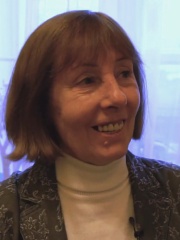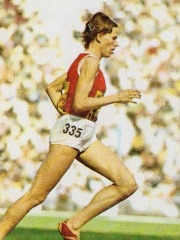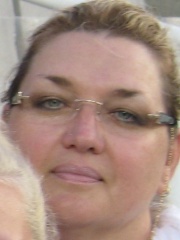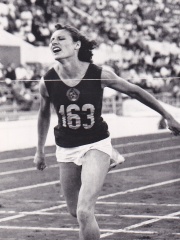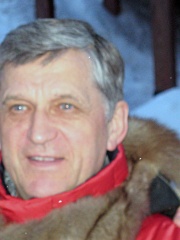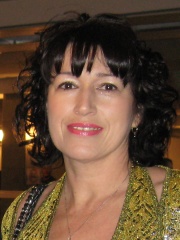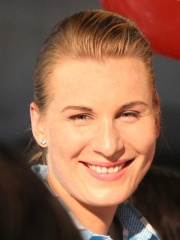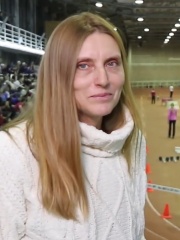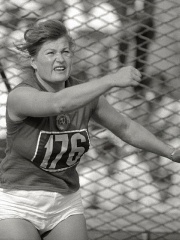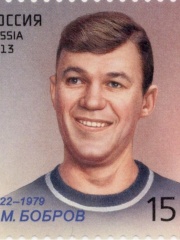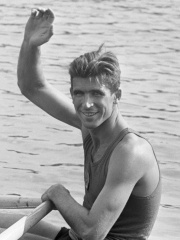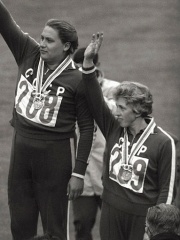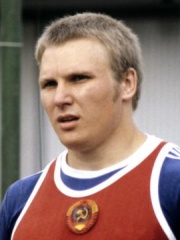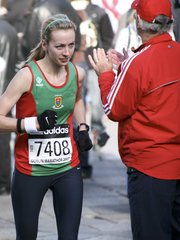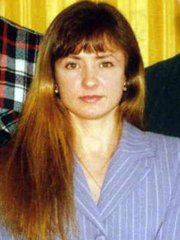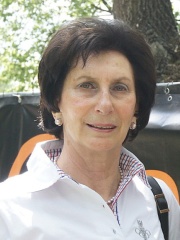
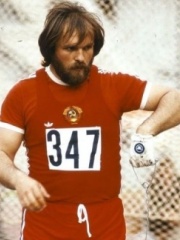
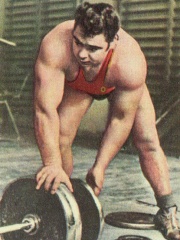
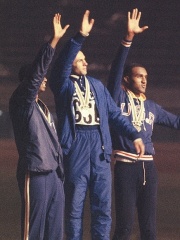
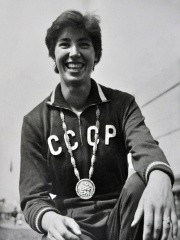
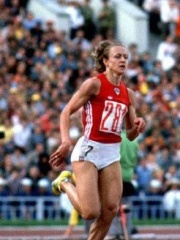
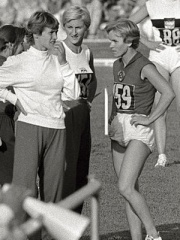
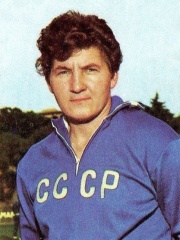
The Most Famous
ATHLETES from Russia
This page contains a list of the greatest Russian Athletes. The pantheon dataset contains 6,025 Athletes, 676 of which were born in Russia. This makes Russia the birth place of the 3rd most number of Athletes behind United States, and Germany.
Top 10
The following people are considered by Pantheon to be the top 10 most legendary Russian Athletes of all time. This list of famous Russian Athletes is sorted by HPI (Historical Popularity Index), a metric that aggregates information on a biography's online popularity. Visit the rankings page to view the entire list of Russian Athletes.

1. Irena Szewińska (1946 - 2018)
With an HPI of 64.82, Irena Szewińska is the most famous Russian Athlete. Her biography has been translated into 45 different languages on wikipedia.
Irena Szewińska (née Kirszenstein; Polish pronunciation: [iˈrɛna ʂɛˈviɲska]; 24 May 1946 – 29 June 2018) was a Polish sprinter who was one of the world's foremost track athletes for nearly two decades, in multiple events. She won a total of seven Olympic medals including three golds. She is the only athlete in history, male or female, to have held the world record in the 100 m, the 200 m and the 400 m events. She was voted the Polish Sports Personality of the Year four times. In 2016, she was awarded Poland's highest decoration, the Order of the White Eagle.

2. Yuriy Sedykh (1955 - 2021)
With an HPI of 64.35, Yuriy Sedykh is the 2nd most famous Russian Athlete. His biography has been translated into 40 different languages.
Yuriy Georgiyevich Sedykh (Russian: Ю́рий Гео́ргиевич Седы́х, Ukrainian: Юрій Георгійович Сєдих; 11 June 1955 – 14 September 2021) was a track and field athlete who represented the Soviet Union from 1976 to 1991 in the hammer throw. He was a European, World and Olympic Champion, and holds the world record with a throw of 86.74 m in 1986.

3. Vasily Alekseyev (1942 - 2011)
With an HPI of 63.97, Vasily Alekseyev is the 3rd most famous Russian Athlete. His biography has been translated into 30 different languages.
Vasily Ivanovich Alekseyev (Russian: Василий Иванович Алексеев; 7 January 1942 – 25 November 2011) was a Soviet weightlifter. He set 80 world records and 81 Soviet national records in weightlifting and won Olympic gold medals at the 1972 and 1976 games.

4. Valeriy Brumel (1942 - 2003)
With an HPI of 62.89, Valeriy Brumel is the 4th most famous Russian Athlete. His biography has been translated into 29 different languages.
Valeriy Nikolayevich Brumel (Russian: Валерий Николаевич Брумель; 14 April 1942 – 26 January 2003) was a Soviet-Russian high jumper. The 1964 Olympic champion and multiple world record holder, he is regarded as one of the greatest athletes ever to compete in the high jump. His international career was ended by a motorcycle crash in 1965.

5. Pyotr Bolotnikov (1930 - 2013)
With an HPI of 62.62, Pyotr Bolotnikov is the 5th most famous Russian Athlete. His biography has been translated into 36 different languages.
Pyotr Grigoryevich Bolotnikov (Russian: Пётр Григо́рьевич Боло́тников; 8 March 1930 – 20 December 2013) was a Soviet Track and field athlete who competed mainly in long-distance running events. He was the winner of the 10,000 metres at the 1960 Summer Olympics. Born in Zinovkino, Krasnoslobodsky District, Mordovian ASSR (now the Republic of Mordovia), Bolotnikov started athletics only at age twenty, when he joined the Soviet Army. He trained at VSS Spartak, coached by Grigory Nikiforov. Bolotnikov won his first national championship title in 10,000 m in 1957, when he surprisingly beat the great Vladimir Kuts in a finishing straight by 0.2 seconds. He became the double Soviet champion in 5000 m and 10,000 m from 1958 to 1962. He also won the national 10,000 m title in 1964 and national cross country title in 1958. In 1959 he became the Honoured Master of Sports of the USSR. Bolotnikov participated already at the 1956 Summer Olympics, but without any success. At the Rome Olympics in 1960, Bolotnikov controlled the 10,000 m race from the start to end, beating the main favourites Hans Grodotzki from Germany and Murray Halberg from New Zealand by five seconds. On 5 October 1960, in Kiev, Bolotnikov lowered the 10,000 metres world record by almost twelve seconds to 28:18.8. Just two weeks before the 1962 European Championships in Belgrade, on 11 August 1962 in Moscow, Bolotnikov lowered his own 10,000 m world record by 0.6 seconds to 28:18.2, thus becoming the main favourite at long distances at the Championships. He easily won the 10,000 m run, but was surprisingly beaten to third in 5,000 m. After the unsuccessful 1964 Summer Olympics, Bolotnikov decided to retire from athletics in 1965. He received the Order of Lenin in 1960. Bolotnikov died on 20 December 2013, at the age of 83.

6. Elvīra Ozoliņa (b. 1939)
With an HPI of 62.56, Elvīra Ozoliņa is the 6th most famous Russian Athlete. Her biography has been translated into 28 different languages.
Elvīra Anatoļjevna Ozoliņa (Russian: Эльвира Анатольевна Озолина, born 8 October 1939) is a retired Soviet javelin thrower. In 1960 she won gold medal with an Olympic Record of 55.98 m and was awarded the Order of the Red Banner of Labour. Between 1960 and 1963 she set three world records. In 1964 she became the first woman to surpass 60 m (61.38 m, at Soviet Championships), but this result was not ratified as a world record by IAAF. In the 1964 Olympic final she fouled her last four attempts and finished in a disappointing fifth place. Domestically she won the national title in 1959, 1961–62, 1964, 1966, and 1973. In 1969, Ozoliņa married Jānis Lūsis (1939–2020), the 1968 Olympic champion in men's javelin throw. Their son, Voldemārs Lūsis, competed in the same event for Latvia at the 2000 Summer Olympics and 2004 Summer Olympics.

7. Nadezhda Olizarenko (1953 - 2017)
With an HPI of 61.48, Nadezhda Olizarenko is the 7th most famous Russian Athlete. Her biography has been translated into 29 different languages.
Nadezhda Fyodorovna Olizarenko (Russian: Надежда Фёдоровна Олизаренко, Ukrainian: Надія Федорівна Олізаренко; née Mushta; 28 November 1953 – 18 February 2017) was a Soviet middle-distance runner. At the 1980 Olympics she won the 800 m event, setting a world record at 1:53.43, and finished third in the 1500 m. Her 800 m world record was improved in 1983, but still remains the second-best time over that distance. Other than world record holder Jarmila Kratochvílová in 1983, only two athletes, Pamela Jelimo of Kenya, in 2008, and Caster Semenya of South Africa, in 2018, have come within a second of Olizarenko's mark since it was set. Olizarenko won the 1986 European title in the 800 m, but failed to reach the final in this event at the 1988 Olympics. She still holds the world record in the 4 × 800 m relay set in 1984.

8. Vera Krepkina (1933 - 2023)
With an HPI of 61.41, Vera Krepkina is the 8th most famous Russian Athlete. Her biography has been translated into 26 different languages.
Vera Samuilovna Krepkina, née Kalashnikova, (Russian: Вера Самуиловна Крепкина (Калашникова); 15 April 1933 – 25 April 2023) was a Soviet-Ukrainian track and field athlete. She competed for the Soviet Union at the 1952, 1956, and 1960 Olympics. At all these Olympics she finished fourth in the 4 × 100 m relay and was eliminated in the heats of the 100 m sprint. In 1960, she also took part in the long jump and won a surprise gold medal with an Olympic record of 6.37 m, ahead of the defending champion Elżbieta Krzesińska and the world record holder Hildrun Claus. At the European Championships she won gold medals in the 4 × 100 m relay in 1954 and 1958 and finished second in the 100 m in 1958. She was a member of the Soviet team that set a world record in the 4 × 100 m relay in 1956, and she tied the world record (11.3 seconds) in the 100 meter dash in 1958. During her career Krepkina won eight Soviet titles: 100 m in 1952, 1957 and 1958; 200 m in 1952; 4 × 100 m relay in 1952, 1960 and 1965; and 4 × 200 m relay in 1952. In retirement she worked as a children's athletics coach in Ukraine. Krepkina died on 25 April 2023, at the age of 90.

9. Nadezhda Chizhova (b. 1945)
With an HPI of 60.52, Nadezhda Chizhova is the 9th most famous Russian Athlete. Her biography has been translated into 26 different languages.
Nadezhda Vladimirovna Chizhova (Russian: Надежда Владимировна Чижова, born 29 September 1945) is a retired Russian shot putter who won three Olympic medals and four European titles, and set seven new world records. She became the first woman to break both the 20 m (66 ft) and 21 m (69 ft) barriers. She retired after the 1976 Olympics and later worked as athletics coach in Saint Petersburg.
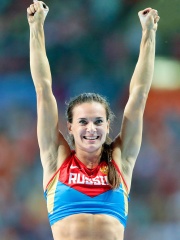
10. Yelena Isinbayeva (b. 1982)
With an HPI of 60.27, Yelena Isinbayeva is the 10th most famous Russian Athlete. Her biography has been translated into 73 different languages.
Yelena Gadzhievna Isinbayeva (Russian: Елена Гаджиевна Исинбаева, IPA: [jɪˈlʲɛnə gɐˈdʐɨjɪvnə ɪsʲɪnˈbajɪvə]; born 3 June 1982) is a Russian former pole vaulter. She is twice an Olympic gold medalist (2004 and 2008), three-times a World Champion (2005, 2007 and 2013), the current world record holder in the event, and is widely considered the greatest female pole-vaulter of all time. Isinbayeva was banned from the 2016 Rio Olympics after revelations of an extensive state-sponsored doping programme in Russia, thus dashing her hopes of a grand retirement winning the Olympic gold medal. She retired from athletics in August 2016 after being elected to serve an 8-year term on the IOC's Athletes' Commission. Isinbayeva has been a major champion on nine occasions (Olympic, World outdoor and indoor champion and European outdoor and indoor champion). She was also the jackpot winner of the IAAF Golden League series in 2007 and 2009. After poor performances at the World Championships in 2009 and 2010, she took a year-long break from the sport. She became the first woman to clear the five-metre barrier in 2005. Her existing world record is 5.06 m outdoors, set in Zürich in August 2009. It is still unbeaten, as of 2024. Her 5.01 m indoors was the world record for just over a year. The latter was Isinbayeva's twenty-eighth pole vault world record. Isinbayeva was named Female Athlete of the Year by the IAAF in 2004, 2005 and 2008, and World Sportswoman of the Year by Laureus in 2007 and 2009. In 2007 she entered in the FICTS "Hall of Fame" and was awarded with "Excellence Guirlande D'Honneur". She was given the Prince of Asturias Award for Sports in 2009. Isinbayeva is one of only eleven athletes (along with Valerie Adams, Usain Bolt, Veronica Campbell-Brown, Armand Duplantis, Jacques Freitag, Kirani James, Faith Kipyegon, Jana Pittman, Dani Samuels, and David Storl) to win World Championship titles at the youth, junior, and senior levels of an athletic event.
People
Pantheon has 676 people classified as Russian athletes born between 1914 and 2006. Of these 676, 584 (86.39%) of them are still alive today. The most famous living Russian athletes include Elvīra Ozoliņa, Nadezhda Chizhova, and Yelena Isinbayeva. The most famous deceased Russian athletes include Irena Szewińska, Yuriy Sedykh, and Vasily Alekseyev. As of April 2024, 73 new Russian athletes have been added to Pantheon including Andrei Chemerkin, Tatyana Shikolenko, and Sergey Danilin.
Living Russian Athletes
Go to all RankingsElvīra Ozoliņa
1939 - Present
HPI: 62.56
Nadezhda Chizhova
1945 - Present
HPI: 60.52
Yelena Isinbayeva
1982 - Present
HPI: 60.27
Tatyana Kazankina
1951 - Present
HPI: 58.54
Lyudmila Bragina
1943 - Present
HPI: 58.21
Natalya Lisovskaya
1962 - Present
HPI: 57.66
Lyudmila Shevtsova
1934 - Present
HPI: 57.39
Alexander Tikhonov
1947 - Present
HPI: 56.49
Tatyana Anisimova
1949 - Present
HPI: 56.40
Olha Bryzhina
1963 - Present
HPI: 55.95
Anastasiya Kuzmina
1984 - Present
HPI: 55.39
Irina Privalova
1968 - Present
HPI: 55.32
Deceased Russian Athletes
Go to all RankingsIrena Szewińska
1946 - 2018
HPI: 64.82
Yuriy Sedykh
1955 - 2021
HPI: 64.35
Vasily Alekseyev
1942 - 2011
HPI: 63.97
Valeriy Brumel
1942 - 2003
HPI: 62.89
Pyotr Bolotnikov
1930 - 2013
HPI: 62.62
Nadezhda Olizarenko
1953 - 2017
HPI: 61.48
Vera Krepkina
1933 - 2023
HPI: 61.41
Nina Ponomaryova
1929 - 2016
HPI: 60.16
Vsevolod Bobrov
1922 - 1979
HPI: 59.87
Vyacheslav Ivanov
1938 - 2024
HPI: 59.59
Galina Zybina
1931 - 2024
HPI: 59.52
Sergey Litvinov
1958 - 2018
HPI: 59.23
Newly Added Russian Athletes (2025)
Go to all RankingsAndrei Chemerkin
1972 - 2025
HPI: 51.87
Tatyana Shikolenko
1968 - Present
HPI: 46.92
Sergey Danilin
1960 - 2021
HPI: 46.90
Valerios Leonidis
1966 - Present
HPI: 46.47
Alina Ivanova
1969 - Present
HPI: 46.06
Tatyana Sadovskaya
1966 - Present
HPI: 45.33
Vladimir Andreyev
1966 - 2024
HPI: 45.17
Roman Monchenko
1964 - 2020
HPI: 45.02
Aleksandr Popov
1965 - Present
HPI: 44.92
Juri Kashkarov
1963 - Present
HPI: 44.08
Yelena Afanasyeva
1967 - Present
HPI: 44.00
Svetlana Petcherskaia
1968 - Present
HPI: 43.98
Overlapping Lives
Which Athletes were alive at the same time? This visualization shows the lifespans of the 25 most globally memorable Athletes since 1700.

